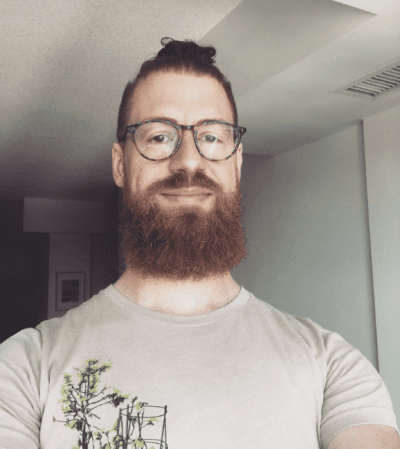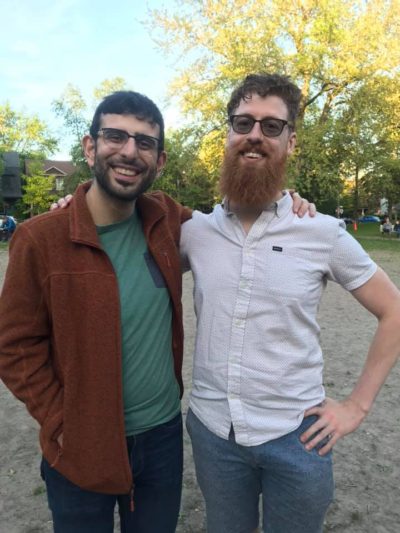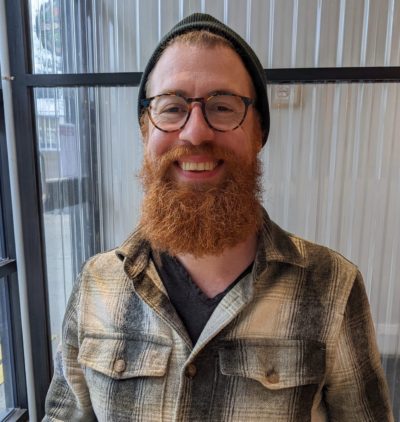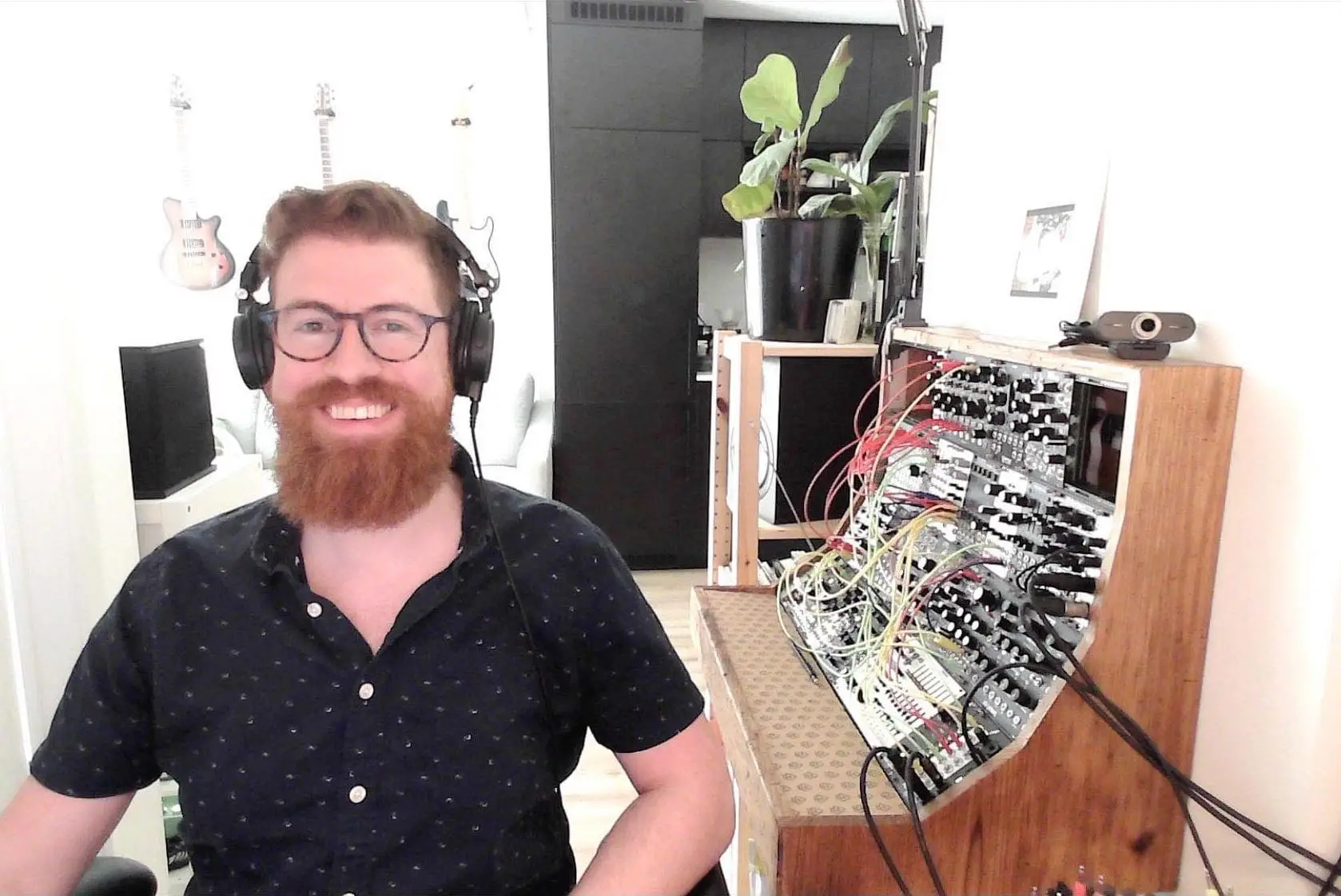Michael Palumbo was born in Toronto, Canada, where he currently resides. Now 35, Michael was 32 years old when he learned about his Klinefelter adult diagnosis.
Growing up:
 Living in Toronto with his parents and younger sister, Michael felt he had a fortunate upbringing. He went to good schools, where he had teachers who were interested in him as a person. However, despite these advantages, he struggled in school, consistently receiving Cs and Ds. He recalled, “Every teacher had a different approach. I had teachers that rode me hard and others that were like absentee landlords, and in that situation, I was a complete basket case.” He was bullied on occasion, saying, “there was always someone that was a shithead and decided to target me from time to time.”
Living in Toronto with his parents and younger sister, Michael felt he had a fortunate upbringing. He went to good schools, where he had teachers who were interested in him as a person. However, despite these advantages, he struggled in school, consistently receiving Cs and Ds. He recalled, “Every teacher had a different approach. I had teachers that rode me hard and others that were like absentee landlords, and in that situation, I was a complete basket case.” He was bullied on occasion, saying, “there was always someone that was a shithead and decided to target me from time to time.”
Michael’s parents also recognized something was amiss and did their best to figure out what it was. They sent Michael to many specialists, from psychologists to tutors to learning specialists. While Michael recalled it was hard to go to specialists when his friends didn’t, he also said it was good to have the support. He was tested for Asperger syndrome, and there were also aptitude tests. He said, “On the outside, I seemed like a nice bright kid, but I couldn’t put things together to get As and Bs.”
High school
For high school, Michael attended a school that focused heavily on the arts. There were many classical extracurricular courses and clubs to get involved with. He had plenty of friends, but f stumbled when it came to girls. He would ask out those he had crushes on but was rejected. Michael said, “I was trying on personalities, and I had difficulty saying what I thought if it wasn’t with a joke. It was difficult to find the words or what I felt.”
He was the “funny person, put my head down and played music and joined clubs. I wasn’t class clown; I hated being the center of attention.” He developed a keen interest in Tae Kwon Do and did curling for several years. Unfortunately, as he increased in late middle and early high school, he grew painful bone spurs, preventing him from continuing with Tae Kwon Do. While attending school dances, he often felt self-conscious about being the tallest person on the dance floor and didn’t like feeling like standing out from the crowd.
During high school, Michael devoted much of his free time to volunteering, as, at the time, he didn’t have ambitions to attend college. He spent his other free time playing video games, playing in a bad, and spending time with a group of close friends.
After high school:
Following high school, Michael stayed home for a couple of years, then got an apartment with five friends. They would host jam sessions in their backyard, which the neighbors hated and called the cops on them for. However, during this time, Michael struggled with depression and spent much time alone in his room. Feeling like he was uncomfortable being the center of attention, Michael reflected, “I would find that I would have to pretend that I was doing ok even though I was honestly feeling lonely. Because I never experimented with saying how I felt, I never allowed myself to feel comfortable with how I felt. Not until much later on.”
College life:
After a few years of living with his buddies, Michael became interested in experimental music. He decided to apply for college, reviewed his recordings to create a portfolio, then applied to Concordia University. He lived alone, which allowed him the freedom to work on his assignments, but he was also lonely. Even though he regularly attended festivals, he still wasn’t getting enough social interaction. He would often not leave his house for days, and “It would take courage to go across the street to get cereal.”
After four years, he received his Bachelor of Fine Arts in Electroacoustic Music Composition, then applied to graduate school. Following earning his master’s, he enrolled in a Ph.D. program, which he is currently attending—his goal is to make his degree and become a professional performer. In the meantime, he also works as a freelance software developer.
Klinefelter adult diagnosis
Michael described his path to receiving a Klinefelter adult diagnosis as a “complete fluke.” He had noticed some hair loss that started with thinning across his forehead and had seen a naturopath. After bloodwork was ordered, it was discovered that the follicle-stimulating and luteinizing hormones were 5-6x higher than average. About six months later, he was referred to an endocrinologist, who immediately said he thought Michael might have Klinefelter syndrome.
He ordered a karyotype test and a sperm count, which confirmed his suspicions. However, the delivery of the suspected diagnosis left something to be desired when the doctor said, “I think it might be KS, but don’t worry about it. You’re super smart.” When the official diagnosis was made, the endocrinologist added, “you’re doing a Ph.D., so I don’t think it’s going to affect you that much.” Michael recalled the negative impact of these conversations, saying, “over and over again, he was voicing this bias that having a variation in your genetics is going to make you less smart.”
Understanding the diagnosis
 When the doctor said he wouldn’t be able to have children “normally,” Michael recalled the comment “didn’t land.” Even though he was trying to be empathetic, the doctor’s statement, “yeah, it sucks, doesn’t it,” didn’t provide Michael’s support. After discussing the diagnosis with his partner, Michael needed to take some time to process it. He “decided to close the door and play a videogame for six or seven hours straight because I was just beside myself.”
When the doctor said he wouldn’t be able to have children “normally,” Michael recalled the comment “didn’t land.” Even though he was trying to be empathetic, the doctor’s statement, “yeah, it sucks, doesn’t it,” didn’t provide Michael’s support. After discussing the diagnosis with his partner, Michael needed to take some time to process it. He “decided to close the door and play a videogame for six or seven hours straight because I was just beside myself.”
The suspected diagnosis led Michael to reflect on and question various aspects of his life. From an early age, he wondered, “why would I test high in certain aptitude tests at school but have lower grades? Why did I get injuries in sports? Why did I get sick all the time? I had given up on why it was that I was so different. Honestly, the thing that had me beside me was that I can’t take it if this diagnosis is wrong.”
He added, “My locker was extremely messy at school. I was forgetful; I would be excited about something for a week or a month, then someone would ask me how it was going, and I would forget what they were talking about. Then I was diagnosed with ADD (ADHD) in high school. I had a lot of friends and was outgoing. I remember feeling like everyone was older than me. And I remember people treating me like I was younger than them. A whole laundry list of things didn’t seem to have any connecting thread.”
There were some things about the diagnosis that was difficult to swallow. Michael and his partner at the time were trying to conceive. This gave him something to focus on that wasn’t just thinking about the diagnosis. Michael said, “Another part that was shitty was going back and thinking about things I had experienced, but I got into a toxic loop of if I had known sooner, I would have done this or that.
I was locked in this thinking of what testosterone would have been like when I was 15 or 20.” However, good things came out of the diagnosis as well. Michael joined Facebook groups and connected with the Klinefelter syndrome and XXY community. He could connect with others who had experienced an adult Klinefelter diagnosis. He met Ryan and participated in a podcast to share his story, where they talked about “the idea of approaching the diagnosis with an open heart.”
Fertility journey:
 Since his adult Klinefelter diagnosis, Michael has been on his fertility journey for the last two years. In the first year after his diagnosis, he didn’t take testosterone as he was preparing for a sperm withdrawal attempt or micro-TESE. He stopped using cannabis and took a break from hot yoga to give himself as many chances of conception as possible. He and his now ex-partner had been together for 11 years. Even though they hadn’t been trying to conceive before the diagnosis, Michael realized it was something he needed to consider sooner rather than later. After his microTESE surgery failed to find viable sperm, Michael felt himself going through a “really dark period” and felt “crushed.”
Since his adult Klinefelter diagnosis, Michael has been on his fertility journey for the last two years. In the first year after his diagnosis, he didn’t take testosterone as he was preparing for a sperm withdrawal attempt or micro-TESE. He stopped using cannabis and took a break from hot yoga to give himself as many chances of conception as possible. He and his now ex-partner had been together for 11 years. Even though they hadn’t been trying to conceive before the diagnosis, Michael realized it was something he needed to consider sooner rather than later. After his microTESE surgery failed to find viable sperm, Michael felt himself going through a “really dark period” and felt “crushed.”
Michael focused on himself and got into the best shape of his life. While they each had individual therapists, Michael and his partner were also working through some issues in couple’s counseling when they realized they weren’t right for each other. They continued with the couple’s therapy to make their breakup as smooth as possible for both. In the meantime, the diagnosis slid to the back of his mind. Three months after the diagnosis, his urologist discovered a lump in Michael’s testicle that they feared might be cancerous. Michael had it removed and waited for the results of the biopsy.
Even though he was still recovering, Michael threw himself into music as his method of coping. He also rediscovered his love for music and said, “It had been like seven years since I had played music every day, and I realized how important it was to me. When I got back to Toronto, I booked this show with this incredible sax player, and from then on, I was like steadily ramping up to playing a gig a week. The way that I coped was to put myself into music and put myself into a front-seat role as a performer.”
Although he didn’t fully realize it, Michael was dealing with suicidal thoughts. He wished he had known about the diagnosis earlier and struggled with feeling that he was “a fuck up” and feeling “incredibly trapped.” He shared his feelings with his therapist and a friend, who encouraged him to explore his feelings further. realized, “The push for fertility was like a speeding freight train, and all I wanted to do was get off at a stop and look at Klinefelter syndrome.
Or get off at a stop and celebrate that I was playing music again. Or get off at a stop and decide whether we will use a donor or not. And we just went way too fast.” Even though he felt he was ready to be a parent. He said, “the fit just wasn’t there.” Additionally, he had “the testicle removed in June of that year, we had to wait six months, so I had two testicle surgeries within seven months. I had the surgeries in December 2019.”
Testosterone:
One full year after his adult Klinefelter diagnosis, Michael started testosterone treatments. He’d seen some other guys sharing their testosterone journeys and felt excited to start. He said, “I remember the first day I did it, I went into a hot yoga session. W used the gel because I felt I had more control over it. I got up and went and did an hour of hot yoga from 6:30 to 7:30. I put the gel on, and within 20 minutes, I felt like I wanted to ride it out and see what happened. Within 20 minutes, I remember I just had this sense of a backbone. Like someone said something, and I immediately had a thought formed.”
Almost immediately, he began noticing changes in his body. He felt more substantial and more capable of doing manual labor. For the first time, his body began to develop strength. While still tall, he became more comfortable with other attributes, such as wider hips and gynecomastia.
Michael has been on testosterone for two years and has noticed an improvement in his cognitive abilities. He’d been taking medication to manage ADD/ADHD for over seven years but hasn’t needed it since starting testosterone replacement therapy. Michael plans to stay on testosterone for the rest of his life and will be regularly monitored by an endocrinologist. He currently uses the gel version to control the dosage amount he receives.
What Michael would tell others:
 Michael recommended that people diagnosed with Klinefelter syndrome make their mental health a priority. He said, “Honestly, a good therapist is worth every penny, and a couple’s therapist is worth it…If you have a session with a therapist that doesn’t seem right, find another one. When you find a good one, you’ll know.”
Michael recommended that people diagnosed with Klinefelter syndrome make their mental health a priority. He said, “Honestly, a good therapist is worth every penny, and a couple’s therapist is worth it…If you have a session with a therapist that doesn’t seem right, find another one. When you find a good one, you’ll know.”
He also suggested taking time to check in with yourself regularly and take a break if things get to be too much. He said, “Check in with your boundaries often. A fertility journey can consume you. Don’t be afraid to tell people you care about to have them check in on you more or that you need more from them. The most uncomfortable thing I found was going it alone. You can reach out and say how are you doing? I want you to know that I care. Could you be an accountability partner and check in with me once a month? It’s isolating, and it doesn’t have to be.”
About living with the diagnosis, Michael said, “You are doing better than your mind tells you. That’s a big one. I have that in a reminder on my phone that pings me every week. All of the things we are doing come from a place of deep and sincere love for each other. Yes, we want to do better but focus on what you do well. That’s something that is a crucial aspect of growth. Learning to be proud of yourself is important.”




Mike,
I was on testosterone for about 10 years then the government pulled it, and I’m no longer on replacement therapy. I’ve not had any testosterone for almost 45 years and as I go into my senior years, I’m starting to find that there are problems being XXY I am desperately looking for a doctor in the Durham area or if I have to in Toronto but when I was in Toronto doctors gave that up and they were no longer dealing with people that were XXY can you guide me to a place where someone will help me got your name from a friend in Alberta thank you